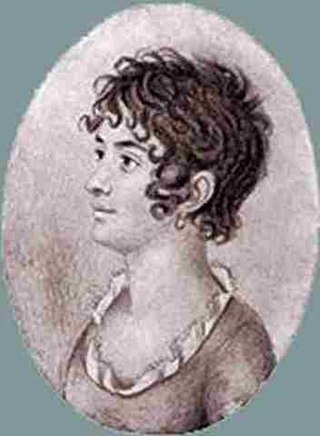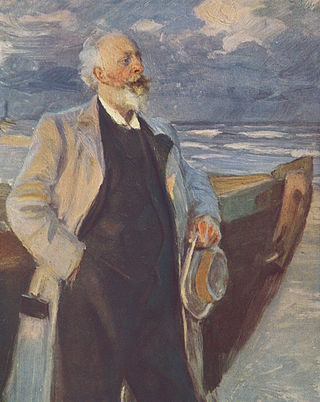
Denmark competed at the 1960 Summer Olympics in Rome, Italy. 100 competitors, 88 men and 12 women, took part in 46 events in 15 sports. Cyclist Knud Enemark Jensen died during the team time trial.

Poul David Reichhardt was a Danish actor, well known for his roles in Danish 1940s/1950s comedies. Later on, he also played more serious and varied roles; he has also starred in Huset på Christianshavn, Matador and as various minor characters in the Olsen-banden films.

Knud Lyne Rahbek was a Danish literary historian, critic, writer, poet and magazine editor.
Mig og min lillebror og storsmuglerne is a 1968 Danish comedy film directed by Lau Lauritzen Jr. and starring Dirch Passer.
The Eckersberg Medal is an annual award of the Royal Danish Academy of Fine Arts. It is named after Christoffer Wilhelm Eckersberg, known as the father of Danish painting.
The Riksmål Society Literature Prize is awarded annually by the Riksmålsforbundet for the outstanding publication in riksmål. The prize was awarded until 2002 by the Oslo and Bærum Riksmål League, when it was taken over by the Riksmålsforbundet.

Karen Margrethe "Kamma" Rahbek, née Heger was a Danish writer, salonist and lady of letters.
This article gives detailed results of the 2007 Danish parliamentary election. The Folketing has 179 members. Of these, 135 are elected by proportional representation at district level, while another 40 are allocated based on votes aggregated to the regional level. An additional four members are elected to represent Greenland and the Faroe Islands.

Danish Academy is an independent organisation founded in 1960 by a circle of Danish intellectuals "to promote Danish esprit and language, especially within the field of literature". It has up to 20 members, currently 18, and is based at Rungstedlund, the former home of author Karen Blixen who was one of the original members. The Academy runs a number of annual literary prizes including most notably its Grand Prize.

De Gyldne Laurbær is a Danish literature award, which was established in 1949. The award is handed by The Committee De Gyldne Laurbær, formerly Boghandlerklubben. The prize is given annually in February or March. Originally the award was a laurel wreath, a golden pin with an inscription, some money and a book gift worth 2500 DKK. Today the award is a laurel wreathe, a diploma and a book gift worth 2500 DKK. The award is handed at a ceremony arranged by the publishing house which has published the winning book and by the Committee De Gyldne Laurbær. Early in January every year the committee sends out ballot to all the Danish bookshops, which then give their vote for a Danish book which was published the year before. An author can only win The Golden Laurel once-in-a-lifetime, so the bookshops can not vote for an author who has already won the prize once before. The winner is usually one of the bestsellers among the Danish books. On the day when it is decided who wins the Golden Laurel, the president of the Committee of The Golden Laurel informs the winner about the award, while journalists follow the event.
The Ministry of Culture's children book prize from Denmark is a prize, which is given in order to honor a special effort for the Danish children's and youth book of high artistic quality. The award can be given either for a single title or for a whole work of an author. Along with the honor follows DKK 30.000, which partially comes from the "tipsmidler" (money from "Danske spil's" gambling, in Denmark a 66,44% of the money of gambling like lottery goes to cultural work and various kind of charity. In 2011 the "tipsmidler" gave a 1,5 billion Danish kroner profit which the government ministries must give to charitable purposes.
The Danish Critics Prize for Literature is an annual Danish literature award. It was established in 1957 by the Danish Publishers Association. Since 1971 the award has been made by the Danish Literature Critics Association after a vote by members. The award currently carries a prize of DKK 30,000. The Association also awards the Georg Brandes-Prize.
The Robert Award for Best Documentary Short is one of the merit awards presented by the Danish Film Academy at the annual Robert Awards ceremony. The award has been handed out since 1984.
The Robert Award for Best Screenplay is one of the merit awards presented by the Danish Film Academy at the annual Robert Awards ceremony. The award has been handed out since 1984, but except in 1991 and 1993. On two occasions, in 2005 and in 2015, the Academy handed out two awards in the category, one for best original screenplay, and one for best adapted screenplay.
The Reumert Award is an annual Danish awards ceremony to recognize excellence in theatre achievements in Denmark. The award was founded by the Bikuben Foundation in 1998, and has been handed annually since then. There are 16 award categories as well as 10 talent awards. A jury of ten specialists in theatre selects the recipients, who receive a statuette and a prize. As of 2016, the recipients also receive an amount of money. The recipients of the Reumert Award of Honour receive DKK 200,000, the recipients of the Talent Prize receive DKK 35,000 and all other categories-recipients receive DKK 40,000. The Reumert prize is named after the Danish actor Poul Reumert (1883–1968).

Drachmannlegatet is a Danish literary award founded in 1917, based on funding derived from the entrance fee to Drachmanns Hus in Skagen. The winner is announced annually on 9 October, the anniversary of the birthday of Danish writer and painter Holger Drachmann (1846–1908).






